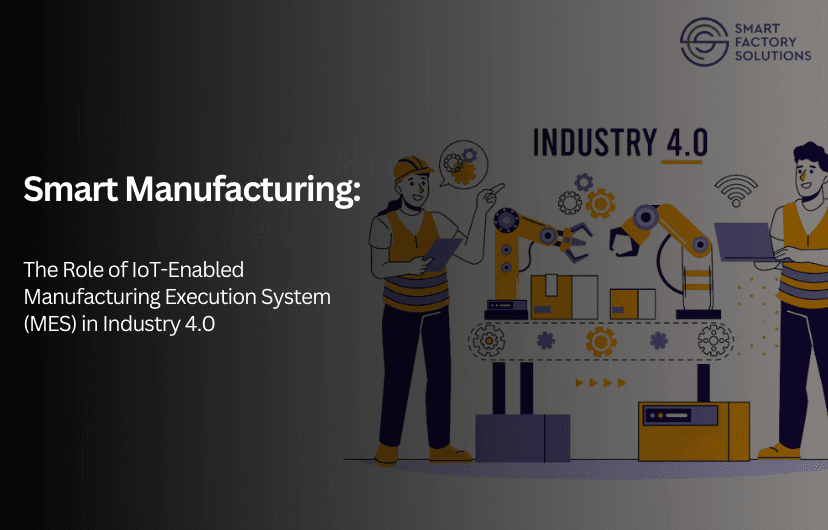Back
Smart Manufacturing: The Role of IoT-Enabled Manufacturing Execution System (MES) in Industry 4.0

The manufacturing sector is undergoing a profound transformation known as Industry 4.0, characterized by the integration of advanced technologies like the Internet of Things (IoT) into traditional manufacturing processes. At the heart of this revolution is the Manufacturing Execution System (MES), a critical technology that, when combined with IoT, creates intelligent factories, optimizes production processes, and enhances overall efficiency.
In this blog, we'll dive into the fundamentals of MES, explore how IoT amplifies its capabilities, and examine the impact these technologies have on modern manufacturing.
Understanding Manufacturing Execution Systems (MES)
What is a Manufacturing Execution System (MES)?
A Manufacturing Execution System (MES) is a software platform designed to monitor, control, and optimize manufacturing operations on the shop floor. It serves as a bridge between higher-level systems (like enterprise resource planning) and the physical production processes. MES collects real-time data from machines, operators, and other resources, offering valuable insights to improve productivity, quality, and compliance.
Key Functions of MES
- Production Scheduling: MES assists in planning and scheduling production activities, ensuring deadlines are met and resources are utilized effectively.
- Quality Management: It maintains product quality by monitoring production processes and conducting real-time quality checks.
- Inventory Management: MES tracks raw materials, work-in-progress (WIP), and finished goods to maintain precise inventory levels.
- Performance Analysis: MES provides insights into machine performance, downtime, and output to enhance efficiency.
- Compliance and Traceability: It ensures manufacturing processes adhere to industry regulations and enables traceability from raw materials to be finished products.
The Role of IoT in Manufacturing
What is IoT?
The Internet of Things (IoT) refers to a network of interconnected devices, sensors, and machines that communicate data over the internet. In manufacturing, IoT devices monitor equipment, track production processes, and gather real-time data from the shop floor.
Benefits of IoT in Manufacturing
- Real-Time Monitoring: IoT facilitates real-time observation of machines and production processes, allowing for quick issue resolution and minimizing downtime.
- Predictive Maintenance: IoT sensors predict equipment failures before they occur, enabling preemptive maintenance and reducing unexpected downtime.
- Data-Driven Decision Making: The data collected by IoT can be analyzed to refine production processes, improve product quality, and minimize waste.
- Enhanced Safety: IoT devices monitor environmental conditions and detect hazards, creating a safer workplace for employees.
How IoT-Enabled MES Transforms Manufacturing
Seamless Data Integration
Integrating IoT with MES enhances both technologies, allowing for the seamless flow of data from shop floor devices to the MES. This integration provides real-time insights into machine performance, environmental conditions, and operator activities, which the MES uses to deliver actionable intelligence.
For example, if IoT data indicates a potential machine failure, the MES can automatically schedule maintenance, order parts, and alert relevant personnel, exemplifying intelligent manufacturing.
Improved Production Efficiency
IoT-enabled MES optimizes production by providing real-time visibility into all manufacturing processes. Operators and managers can monitor production status, identify bottlenecks, and make real-time adjustments. This results in reduced cycle times, minimized downtime, and increased throughput.
IoT-enabled MES also adjusts production schedules dynamically based on real-time data. For instance, if a machine fails, the system can reschedule tasks, reassign resources, and update delivery timelines, ensuring minimal disruption.
Enhanced Quality Control
Quality control greatly benefits from IoT-enabled MES. IoT sensors monitor quality parameters like temperature and humidity during production, and MES analyzes this data to detect quality deviations in real-time.
When a quality issue is identified, Manufacturing Execution System (MES) can halt production, isolate affected batches, and initiate corrective actions, ensuring higher product quality and reducing the risk of costly recalls.
Predictive and Preventive Maintenance
IoT-enabled MES excels in predictive maintenance. Unlike reactive maintenance practices, IoT sensors monitor machine health and forecast maintenance needs, allowing for scheduling during non-production hours.
This approach extends equipment lifespan, reduces maintenance costs, and minimizes unexpected downtime, which is crucial in industries where equipment failure can lead to significant losses or safety hazards.
Supply Chain Optimization
IoT-enabled MES also enhances supply chain management by providing real-time visibility into production status, inventory levels, and material usage. This allows manufacturers to make informed decisions about procurement, production planning, and logistics.
For example, if raw material shortages are detected, MES can automatically reorder supplies to avoid production interruptions. Tracking materials and products throughout the supply chain helps reduce lead times and improve delivery performance.
Industry 4.0 and the Future of Manufacturing
What is Industry 4.0?
Industry 4.0 represents the current wave of automation and data exchange in manufacturing, driven by technologies like IoT, artificial intelligence (AI), big data, and cloud computing. The aim is to create smart factories where machines, systems, and humans interact seamlessly.
The Role of IoT-Enabled MES in Industry 4.0
IoT-enabled MES is a critical component of Industry 4.0. It facilitates real-time data exchange between machines, systems, and people, enabling greater flexibility, efficiency, and responsiveness in production.
In an Industry 4.0 setting, Manufacturing Execution System (MES) not only manages production but also acts as a central hub for data exchange, connecting with IoT devices, AI algorithms, and other systems to form an intelligent manufacturing ecosystem.
For instance, AI can analyze IoT and MES data to optimize production schedules, reduce energy consumption, and enhance product quality. Cloud computing supports the storage and analysis of vast data volumes, providing insights for continuous improvement.
Challenges and Considerations
Despite the advantages, there are challenges with IoT-enabled MES:
- Data Security: With extensive data exchange, robust cybersecurity measures are essential to protect sensitive information.
- Interoperability: Integrating IoT devices with existing MES and systems can be complex, particularly with diverse vendors. Ensuring seamless data exchange is crucial.
- Investment Costs: Implementing IoT-enabled MES involves significant investment in hardware, software, and infrastructure. However, the long-term benefits often outweigh these initial costs.
Conclusion: Embracing the Future of Manufacturing
The integration of IoT with Manufacturing Execution Systems (MES) represents a transformative shift in the manufacturing industry. By offering real-time data, predictive insights, and enhanced process control, IoT-enabled MES drives greater efficiency, quality, and adaptability.
As Industry 4.0 progresses, the role of IoT-enabled MES will become increasingly vital. Manufacturers adopting these technologies will be better positioned to compete globally, adapt to evolving demands, and foster innovation.
In summary, IoT-enabled MES is more than a technological advancement; it is a strategic investment in the future of manufacturing. Leveraging IoT and MES enables the creation of smart factories that are agile, efficient, and equipped to tackle the challenges of Industry 4.0.



